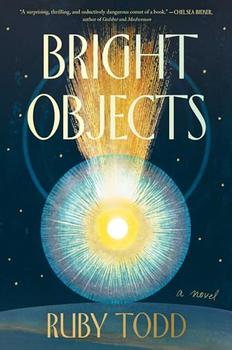Summary | Excerpt | Reviews | Beyond the Book | Readalikes | Genres & Themes | Author Bio

Excerpt
Bright Objects
Some might have thought it unhealthy for a new widow to begin work in a funeral home, especially the same one that just months before had sent off her husband in a premium rosewood casket. But Jericho was a small town, and I was suited to the business. I grew fond of the ritual chores, the somber quiet, the tight-lipped atmosphere of wood polish and plush carpet and heavy drapes. I enjoyed the feeling of marshaling the stricken troops to church, and the soothing sound of a casket closing. I knew the tone to take with the bereaved, knew how to slide around details as if by way of a network of delicate balustrades, to deflect death. But neither was I afraid of allowing the Reaper into the reception room as I served tea to those customers I liked best, who announced themselves with a look that was naked and steely at once, who wanted no part in a pantomime.
The work tired my body and stilled my brain, and offered at least some prospect of sleep at the end of the day. I often had the sense of moving through water, and imagined that if I could just accumulate enough days behind me as mindlessly as possible, I might at last look up to find I had gained distance from the horizon of all that had happened, and see the approach of some kind of shore.
I can still hear the voice of Clarence Bell, the director of Bell Funerals, bemoaning in his soft Midlands accent that another customer was late with their deposit, or intent on printing their own order of service booklets, or bringing their own roses. As soon as I appeared at reception in the mornings he would approach in his ambling widepaced way, diminutive in his overlarge gray suit, and begin shaking his head a few steps from me, emitting little puffs of indignant disbelief as he spoke, half under his breath, as though obliged to relate a string of dirty jokes.
Clarence had a drawn, adenoidal look. His sharp dark eyes would dart around as if searching for escape, and sometimes if I spoke too suddenly, he would jump with the nervous quickness of a cornered marsupial. By the end of any service he always appeared deflated somehow, like he had puffed out too much air, at last resigned to facts which despite being routine appeared to wound him afresh each day.
I knew the morning debrief was over when Clarence drew out a handkerchief from his trouser pocket, lowered his face into it and, with an equine flurry, blew his nose. I had learned early on that my role in this exchange was as a passive witness, and that after nodding and sighing a few times myself in sympathy, I should prepare his coffee without rejoinder or delay, which he would receive in his office in grateful silence. From my station behind the tall mahogany reception desk, I would then commence my review of the day's appointments, peering out every so often through the shop windows at the wide Victorian-era street just waking up, and measure my smile for the first customer, as Clarence had instructed: sincere yet restrained, with a touch of thoughtful gravity.
That summer, Bell Funerals had been asked to oversee the grandest service in the recent memory of our town, and we were all feeling the pressure. Joseph Evans, the fifty-five-year-old eldest son of a once-prominent pastoralist family, and a man of exacting tastes in matters of ceremony, wanted a stately farewell for his mother, a farewell worthy of the woman she had been. Patricia Evans—who had died suddenly after a battle with vascular dementia—was remembered locally as a no-nonsense, capable woman who, despite her affluence and acumen in business, had cared more for others than she had for herself. Widowed in her prime, she had run the ancestral farm and raised her sons alone, while supporting numerous charitable causes and becoming revered for the pumpkin scones she baked for the Country Women's Association.
In the days between Patricia's death and her funeral, Joseph often turned up unannounced, asking for Clarence at reception, with a notebook in hand. He was by turns meditative and tense, but always polite, with a patrician voice and a taste for twill trousers paired with Craftsman boots, as might be expected of a genteel stockman, albeit one with a ponytail.
Excerpted from Bright Objects by Ruby Todd. Copyright © 2024 by Ruby Todd. Excerpted by permission of Simon & Schuster. All rights reserved. No part of this excerpt may be reproduced or reprinted without permission in writing from the publisher.
Your guide toexceptional books
BookBrowse seeks out and recommends the best in contemporary fiction and nonfiction—books that not only engage and entertain but also deepen our understanding of ourselves and the world around us.